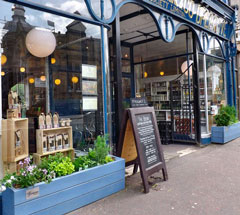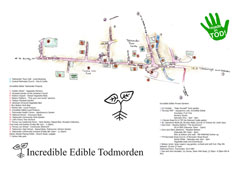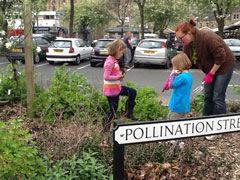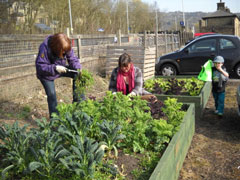
Gender issues in food and farming
Example 5. Incredible Edible Todmorden – and beyond
by Janice Jiggins
The fifth example is from Britain. Again, it is individuals who are making a difference. This story concerns a town in the north of England called Todmorden, it’s an old industrial cotton town. Cotton went away, not much came to take its place, there was lot of unemployment and a feeling of helplessness, especially among the young. A lot of people left and went to Manchester, the nearest big city, and which is not far away. Pam Warhurst and a group of friends were sitting around having coffee one morning, and complaining about,’oh you know the food these days, we’re not sure what's in it any more, but where can we go to find good food, organic food is so expensive' and they were pointing the finger ‘at this company or that and at the government, the government doesn't do this and should do that, the town council should do something’ and then they looked at each other and said ‘for heaven’s sake, why don’t we just do something about it ourselves!’. And they started this amazing citizen led movement, aiming to create a self-sustaining community based on the idea of local food. You can find many such examples in every part of the world now. They’re not an isolated case.
In Todmorden itself they held an open meeting in Pam’s daughter’s café and found great enthusiasm to try to work for a better future. Some started reclaiming tiny spaces in and around the town, by the railway station, on roundabouts, in a patch of wasteland opposite the fire station and growing fruits, vegetables and herbs on these plots. They put up a big notice saying people could take what they wanted, it was all for free. And of course other people stopped and they asked what it was all about and many joined in and the thing rolled on, drawing in more and more people with their own inspiring ideas.
Some are interested in interviewing older people about the kind of food that they used to eat in the past; others are farmers who don't have a successor and who are interested in giving over some of their land for different kinds of production. For instance, on one of the hills surrounding the town a farmer gave some land for growing a traditional variety of potato, that others people wanted to use to make a particular kind of chip or crisp that is highly popular in the area. They started a little company to promote sales of the product. Others have started fishponds, duck farming and honey enterprises; some are busy with seed exchange networks. The demand for allotment gardens has increased; the local vocational training college has started offering horticultural training courses again to meet the demand; and for youngsters, all kinds of competitions and fairs and school events have been started. In fact, every school in the area has started courses on food systems and on production systems and the environment and have started their own school food gardens, partly to supply the school kitchens and partly to pass on skills and stimulate curiosity about food systems.
It is a tremendously inspiring example of what just ordinary everyday practice can do if women and men have imagination and courage and just start off try to do something, in ways that support more inclusive community life, education and local business. It is inspiring many other communities in the U.K. and around the world to do something similar.
Link
You can click on a short film about the movement and see much more about their activities
http://www.incredible-edible-todmorden.co.uk/
Photos



